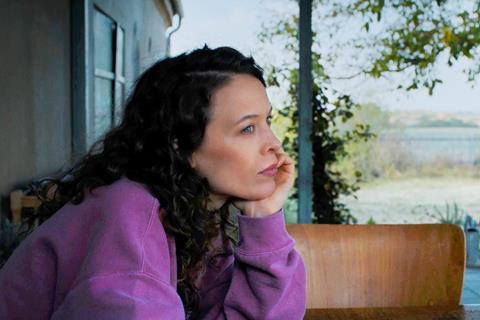Christian Petzold’s fourth collaboration with actor Paula Beer is small but mighty

Dir/scr: Christian Petzold. Germany. 2025. 86 mins.
Having survived a country-road car crash that killed her boyfriend, Berlin music student Laura (Paula Beer) is physically unharmed but mentally shaken. At Laura’s unexpected request, Betty (Barbara Auer), the local woman who witnessed the incident, offers her a place to stay and recuperate, in Christian Petzold’s deft psychological drama about the unorthodox ways in which damaged people find to repair themselves following trauma.
Pleasingly textured and engaging characters
This fourth collaboration between Petzold and Beer is an exercise in economy, pared back to the barest of bones. Although it’s a wisp of a thing, it delivers rich rewards. Mirrors No. 3 (which takes its title from the third movement of a Ravel piano suite) is an elegant demonstration of what can be achieved with limited ingredients in the hands of an inventive creative team and a first-rate cast. The modest scale of the film perhaps explains its premiere in Cannes’ Directors’ Fortnight rather than the main Competition, but the picture’s low-key approach and intimacy is unlikely to dent its arthouse appeal. The Match Factory has already closed multiple deals for the title, including Metrograph Pictures for North America.
The themes of loss and grief suggest a return to more brooding and pensive territory for Petzold, following the astringent humour of his most recent picture, Afire. But Miroirs carries its emotional weight lightly. And while this enigmatic puzzle of a picture is not a comedy as such, there’s gentle humour to be glimpsed between the accumulated baggage of Betty and her family, and their new house guest.
Beer excels as the self-possessed but troubled Laura, whom we first meet staring distractedly at a river in a way that suggests that she might be about to throw herself into it. Her personal magnetism, together with the suggestion of a knotty interior life, makes the character a fascinatingly unknowable presence – a person onto whom others project their needs. Of all the key figures in the story, we know the least about what pains Laura. But Beer persuasively conveys a suggestion of something profoundly amiss from the start, even before the crash that kills her partner.
Part of this seeding of Laura’s mental health crisis is expressed through the film’s sound design, by Petzold’s regular collaborator Dominik Schleier. In the initial scenes, in which Laura floats, disconnected and adrift, through the streets of Berlin, the sounds of the city are punchy and jagged, an overwhelming assault on a young woman who is finding the world a little too much to deal with. Later, at Betty’s home, the ambient sounds take on a reassuring melodic quality – bird song is foregrounded, along with the gentle play of the breeze in the leaves.
Refreshingly, the film refuses to spell out the exact nature of Laura’s malaise. But Betty’s pain is more clearly signposted. There’s an aching need in her eyes from the moment she first catches sight of Laura. And a slip of the tongue – she calls her Yelena by mistake – gives a name to the loss in her life. The tongue-tied reactions of Betty’s husband Richard (Matthias Brandt) and son Max (Enno Trebs) when they first encounter Laura give some indication of the enormity of the crisis that the family has been processing up until this point.
Laura’s serene, sphinx-like presence in the house acts as a catalyst. Richard and Max, both of whom have been living away from the family home, become regular visitors once again. And the broken things in their lives – a dripping tap, a dishwasher, an out-of-tune piano, a bicycle, Betty and Richard’s marriage – are gradually mended. But this oasis of domestic harmony is precariously balanced. Finally, Max feels compelled to reveal a painful truth to Laura. It’s following this revelation that Petzold’s minimal approach to the film’s storytelling starts to feel evasive – this is one of those rare pictures that might have benefited from being a few minutes longer, if only to give us a chance to spend a little more time in the company of these pleasingly textured and engaging characters.
Production company: Schramm Film Koerner Weber Kaiser
International sales: The Match Factory info@matchfactory.de
Producers: Florian Koerner von Gustorf, Michael Weber, Anton Kaiser
Cinematography: Hans Fromm
Editing: Bettina Böhler
Production design: K.D. Gruber
Main cast: Paula Beer, Barbara Auer, Matthias Brandt, Enno Trebs

























No comments yet